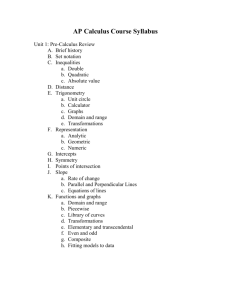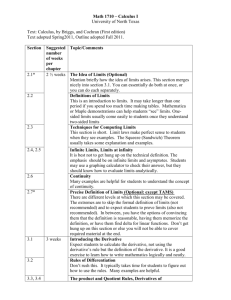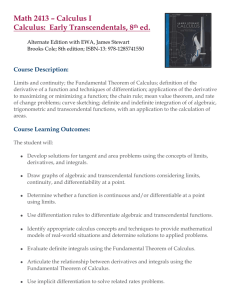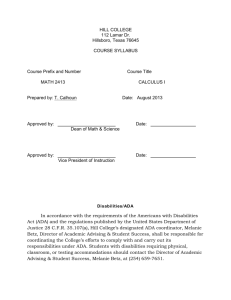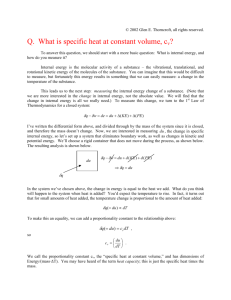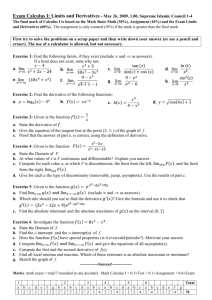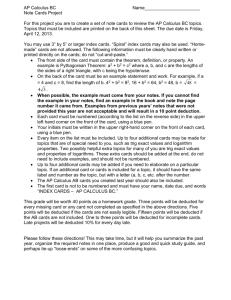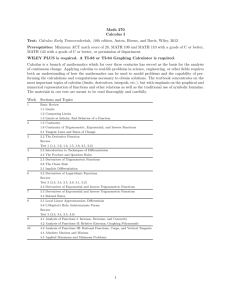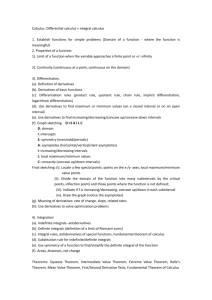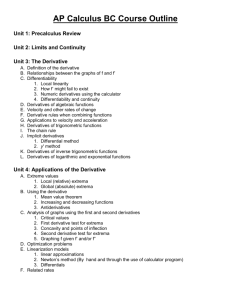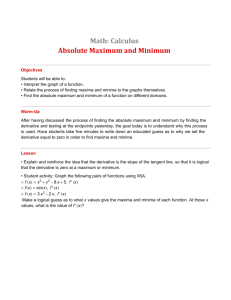AP CALCULUS MANUAL – final project (300 points)
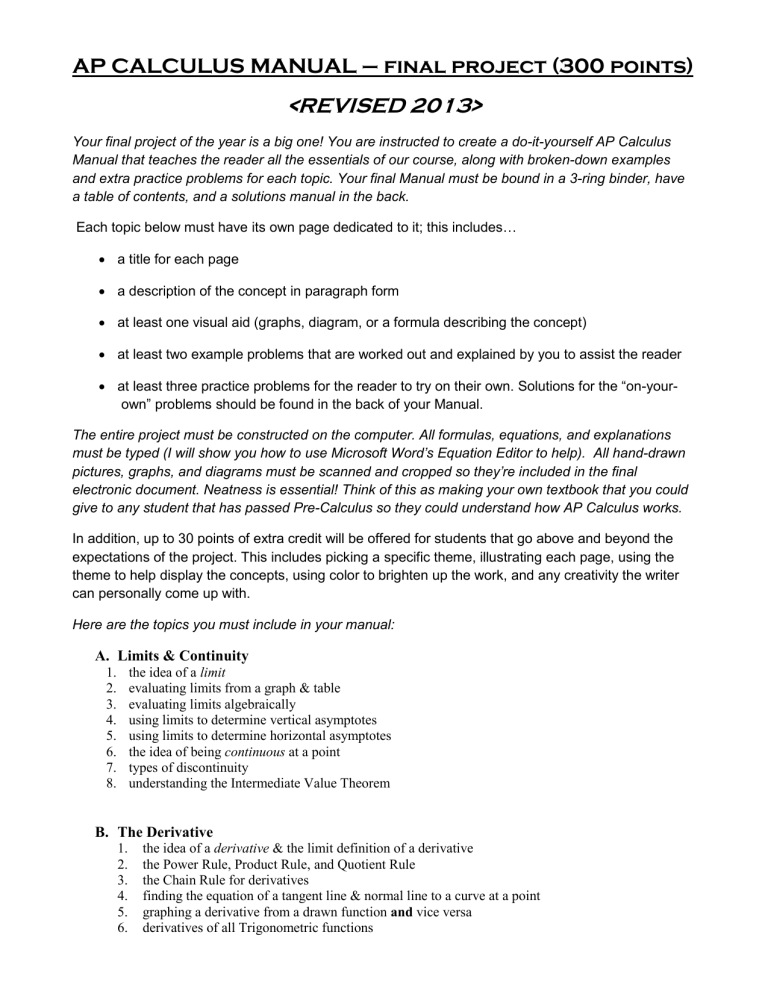
AP CALCULUS MANUAL – final project (300 points)
<REVISED 2013>
Your final project of the year is a big one! You are instructed to create a do-it-yourself AP Calculus
Manual that teaches the reader all the essentials of our course, along with broken-down examples and extra practice problems for each topic. Your final Manual must be bound in a 3-ring binder, have a table of contents, and a solutions manual in the back.
Each topic below must have its own page dedicated to it; this includes …
a title for each page
a description of the concept in paragraph form
at least one visual aid (graphs, diagram, or a formula describing the concept)
at least two example problems that are worked out and explained by you to assist the reader
at least three practice problems f or the reader to try on their own. Solutions for the “on-yourown” problems should be found in the back of your Manual.
The entire project must be constructed on the computer. All formulas, equations, and explanations must be typed (I will show you how to use Microsoft Word’s Equation Editor to help). All hand-drawn pictures, graphs, and diagrams must be scanned and cropped so they’re included in the final electronic document. Neatness is essential! Think of this as making your own textbook that you could give to any student that has passed Pre-Calculus so they could understand how AP Calculus works.
In addition, up to 30 points of extra credit will be offered for students that go above and beyond the expectations of the project. This includes picking a specific theme, illustrating each page, using the theme to help display the concepts, using color to brighten up the work, and any creativity the writer can personally come up with.
Here are the topics you must include in your manual:
A.
Limits & Continuity
1.
the idea of a limit
2.
evaluating limits from a graph & table
3.
evaluating limits algebraically
4.
using limits to determine vertical asymptotes
5.
using limits to determine horizontal asymptotes
6.
the idea of being continuous at a point
7.
types of discontinuity
8.
understanding the Intermediate Value Theorem
B.
The Derivative
1.
the idea of a derivative & the limit definition of a derivative
2.
the Power Rule, Product Rule, and Quotient Rule
3.
the Chain Rule for derivatives
4.
finding the equation of a tangent line & normal line to a curve at a point
5.
graphing a derivative from a drawn function and vice versa
6.
derivatives of all Trigonometric functions
7.
using the 2 nd derivative (points of inflection & determining Concavity on an interval)
8.
the Mean Value Theorem & Rolle’s Theorem
9.
local maxima / minima & using the First and Second Derivative Tests
10. the Extreme Value Theorem (absolute max / min)
11.
Implicit Differentiation (derivatives of relations)
12.
derivatives of all Exponential and Logarithmic functions
13.
using Differentials to approximate a number
14.
derivatives of all Inverse Trigonometric functions
15.
the derivative & tangent line for an Inverse Function
16.
17.
18.
applying derivatives to solve Related Rates determining an Anti-derivative for a given function solving Rectilinear Motion problems with derivatives and anti-derivatives
C.
The Integral
1.
approximating area under a curve with left-hand, right-hand, and trapezoid methods
2.
idea of an Integral and the Fundamental Theorem of Calculus (both parts)
3.
calculating the area between curves
4.
evaluating with “u-substitution”
5.
the average value of a function & Mean Value Theorem for Integrals
6.
displacement vs. total distance (motion & position with integrals)
7.
find volumes of solids of revolution using the disk, washer, & cylindrical shell methods
8.
solving Differential Equations, including problems with initial conditions
9.
sketching a Slope Field when given a differential equation
-------------------------------------------------------------------
You will be graded on the following criteria:
CONTENT, EXPLANATION, & OVERALL AWESOMENESS OF THE CALCULUS…..
225 POINTS
NEATNESS, ORGANIZATION, & LAYOUT OF MANUAL.….
75 POINTS
-------------------------------------------------------
ELABORATE ILLUSTRATIONS, AN ORIGINAL THEME, & OVERALL CREATIVITY
….30 POINTS POSSIBLE EXTRA CREDIT!!
DUE DATE:
TUESDAY, APRIL 29 TH AT 8:15 a.m.

